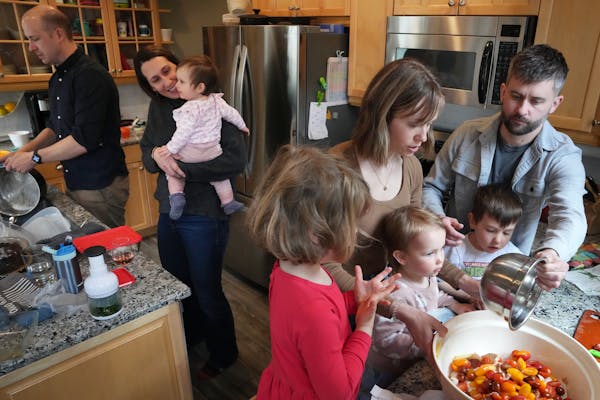The simmering national fight over whether to aid thousands of unaccompanied Central American children who came to the United States illegally is intensifying as more of the children are finding their way to Minnesota.
Rep. Keith Ellison, D-Minn., is leading a push to welcome the children to the state, which could bring in waves of more children and thrust Minnesota to the forefront of this larger and complex national issue.
"We have capacity to help here and we should," Ellison said Monday at a community meeting at the CLUES center on E. Lake Street in Minneapolis.
But immigration advocates and nonprofit groups that often serve traditional refugees are concerned that Minnesota might not be able to handle a deluge of children needing expensive care and facing complex legal cases.
Alicia Bauers, a case manager for children's mental health services at Catholic Charities of St. Paul and Minneapolis, said their group often cannot provide basic services for immigrants in the state.
"I've had a waitlist for my caseload for two years," she said. "We want to provide services … but they can't even get to see me."
DFL Gov. Mark Dayton is expecting a letter from Ellison and others asking him for state resources, such as shelter, for the children.
"I don't know what it entails," Dayton said Monday. "This thing is unfolding rapidly, and the federal response is still being determined. I would have to know where it'd fit in, what it would cost and where we would have sites potentially available."
Dayton finds himself at the center of an issue many other state leaders are grappling with. Last week, Gov. Deval Patrick of Massachusetts vowed to help temporarily house the migrant children.
The issue has even taken on broader political overtones in the upcoming election, where one of Dayton's challengers is demanding that the state not lend any assistance.
GOP gubernatorial candidate Scott Honour last week urged Dayton to "let the president know that Minnesota is not the place to send these kids."
"Before President Obama looks to our state to solve his man-made crisis, it's time for Governor Dayton to join other Midwestern governors and let the president know it's time for him to lead."
Tens of thousands of kids
Tens of thousands of Central Americans fleeing violence in Guatemala, El Salvador and Honduras have crossed the southern border in recent months. The wave of immigrants, many of them unaccompanied minors, has left state and the federal government scrambling to find shelter and resources to provide for the children. In some Southern states, makeshift shelters are overflowing.
Obama has asked Congress to provide $3.7 billion to expand border security, add immigration judges and care for the 57,000 unaccompanied children who have arrived since last fall.
On Monday, Texas Gov. Rick Perry announced he would send 1,000 National Guard troops to the border to boost security.
Community groups and attorneys said Minnesota has experienced a dramatic increase in children fleeing Central America in the past year. Almost all of them have relatives here, but Ellison wants Minnesota to also help those with no ties to the state.
Rebecca Scholtz, an attorney at Mid-Minnesota Legal Aid, which provides legal assistance for low-income residents, said her organization is taking as many cases as it can. We "do not have sufficient resources to meet the current needs of the unaccompanied minors," she said.
Even as the children arrive at their destinations, the prospect of them remaining in the United States is a daunting one, said Deepinder Mayell, director of the Refugee and Immigrant Program for the Advocates for Human Rights, a Minneapolis-based organization that is assisting the children and their families locally.
Those seeking asylum from Central American countries, ravaged by gang violence, have a high legal standard to meet. Sometimes young children must seek asylum without the guarantee of an attorney, for instance. Others face a nest of confusing and complex legal circumstances that can be tough to navigate, even for seasoned attorneys.
"These are some of the most challenging and difficult cases that anybody can bring," Mayell said. "It is really stretching the law to a place that judges may not be able to go."
'You step up'
Ellison said Minnesota is as well equipped as any other state to handle the new children, even though some estimates peg the costs at several hundred dollars per day, per child.
"I'm sure no state in the United States has unused resources just waiting around, but when you have a crisis you step up and do something about it," said Ellison, who has been a leader in the national immigration reform issue.
John Keller, executive director with the Immigrant Law Center of Minnesota, said this refugee crisis is no different from the one that the Hmong and Somali communities faced. Minnesota should be willing to help in the Central American crisis as well, he said.
But Hemlal Kafle, a program manager with Catholic Charities of St. Paul and Minneapolis, said this refugee movement is different. With the Somali and Hmong communities, he said, those refugees were screened in their home country and local groups had ample time to prepare.
"In this case, they are illegally crossing," he said. "It's a different ballpark."
Staff writers Mark Brunswick and Ricardo Lopez contributed to this report.
Alejandra Matos • 612-673-4028

Chants of 'shame on you' greet guests at White House correspondents' dinner shadowed by war in Gaza

